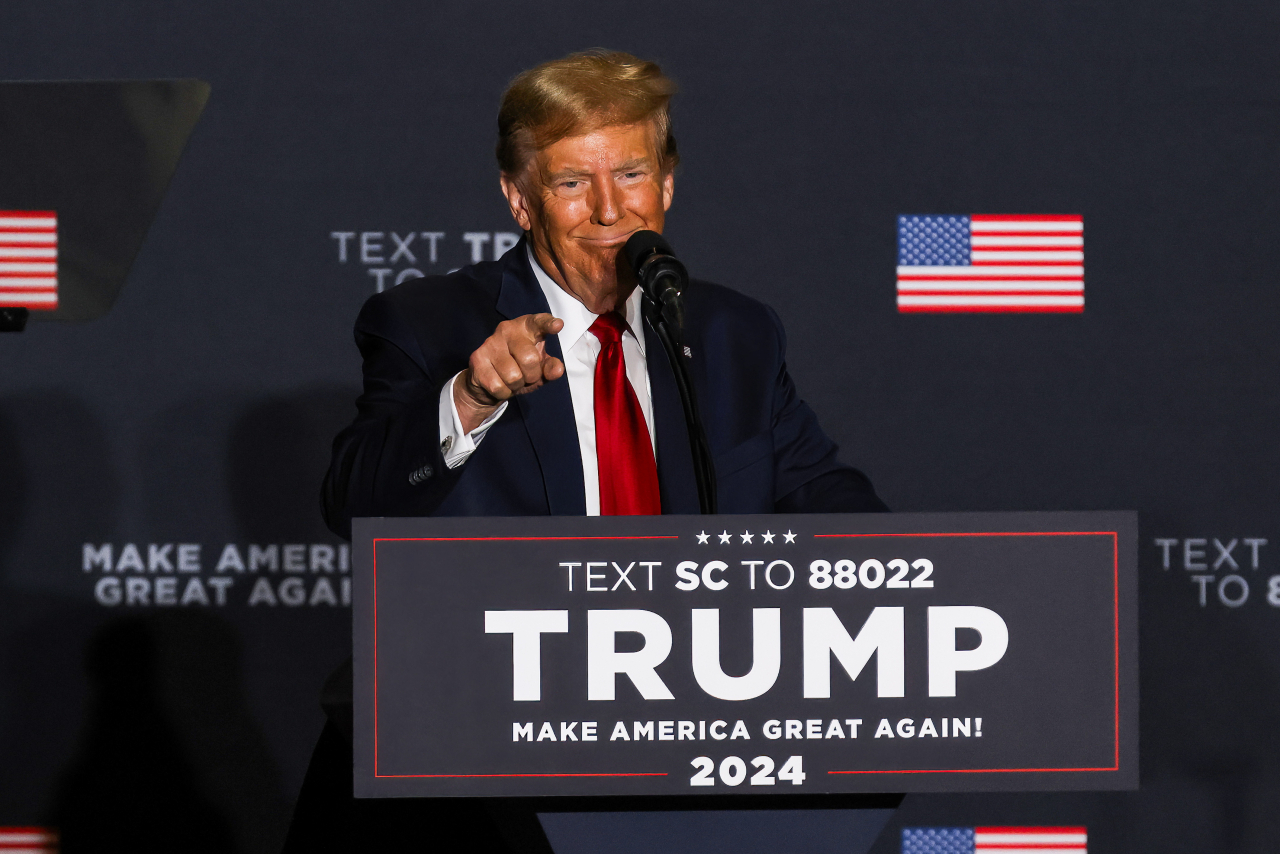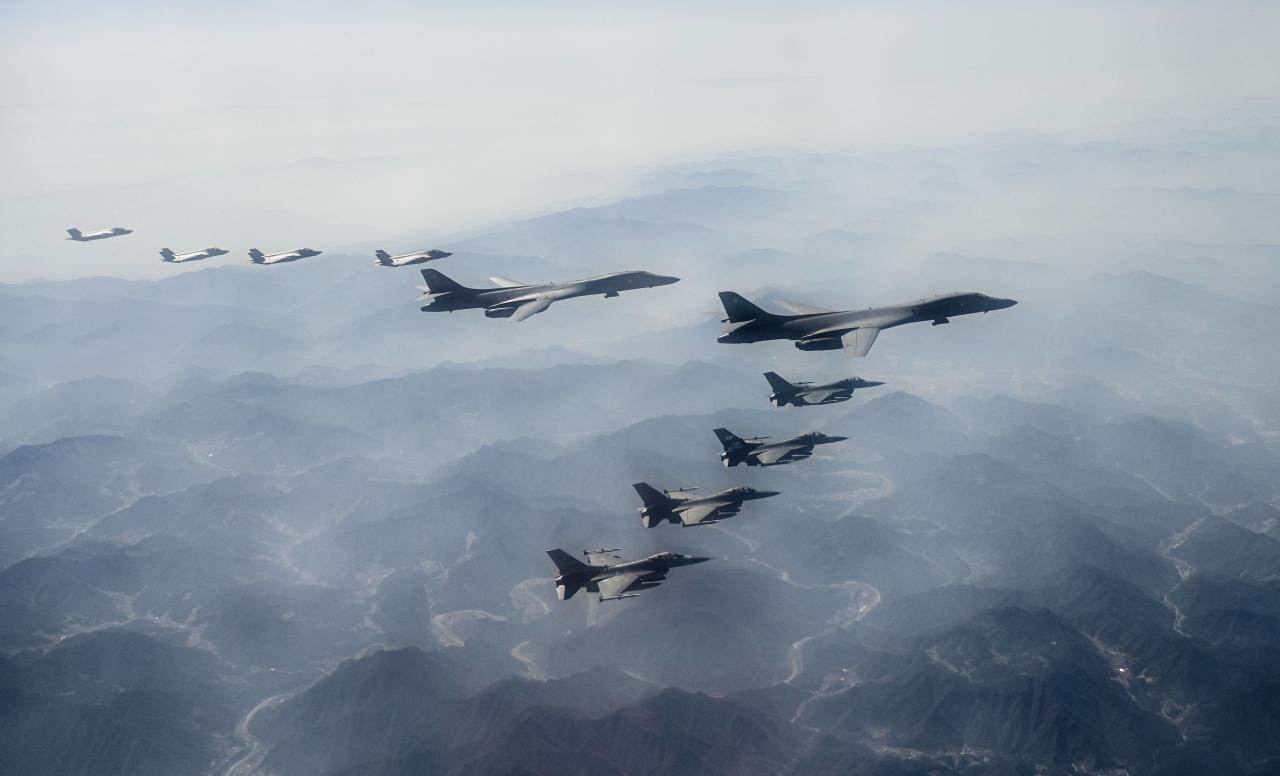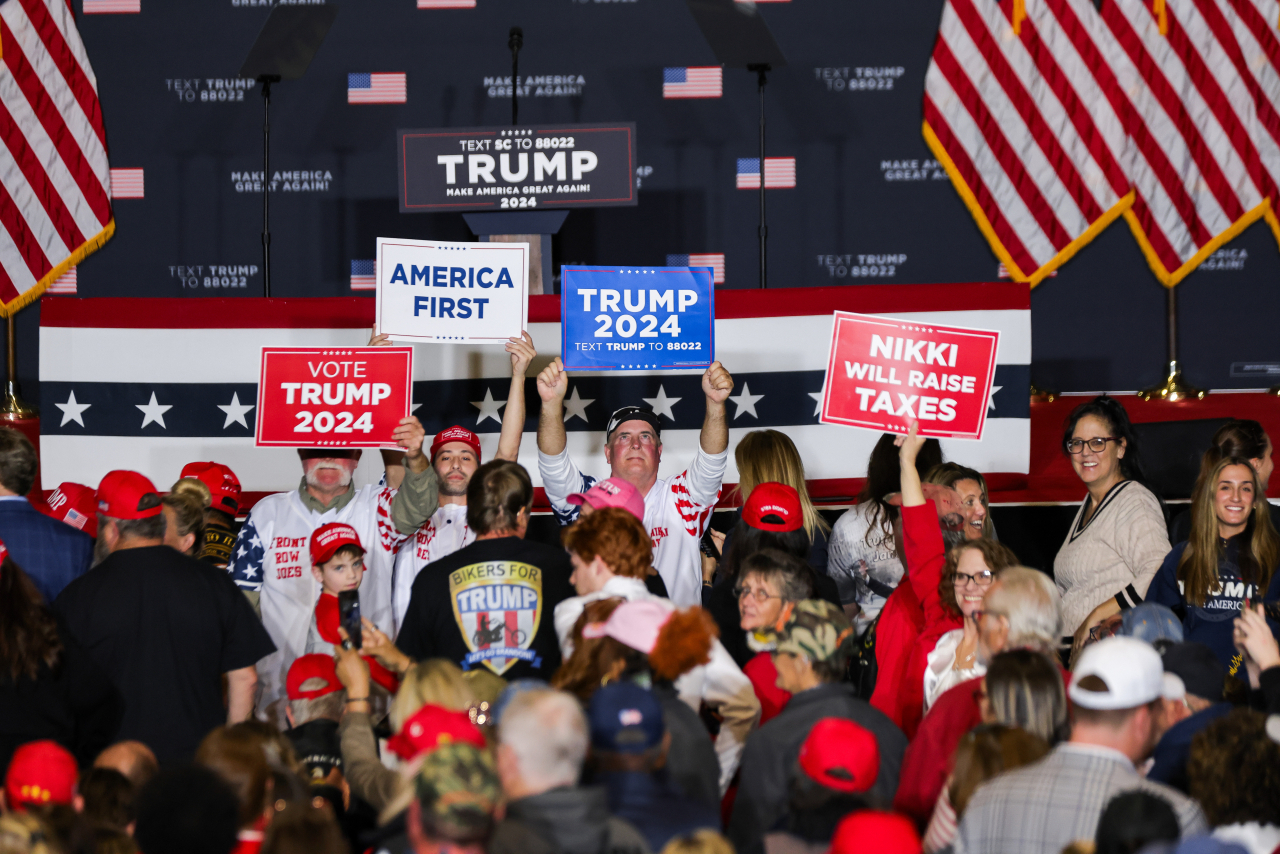Trump's NATO barbs spark concerns of return to 'transactional' alliance
By Ji Da-gyumPublished : Feb. 15, 2024 - 16:25

Former US President Donald Trump's outspoken criticism of NATO and its collective defense resonates deeply with implications for South Korea's security, a cornerstone being the US commitment to defense, especially amid escalating North Korean threats.
After Trump, the front-runner for the Republican Party's presidential nomination, intensified his rhetoric on Saturday, the possibility of his return to power raised concerns about the revival of his transactional approach to the South Korea-US alliance.
During a campaign rally in Conway, South Carolina, Trump issued a stark warning, saying he would encourage Russia to attack NATO members labeled as "delinquent" for failing to meet the alliance's 2 percent defense spending threshold.
Even though the 2 percent target is a guideline and does not entail legal obligations or debts if unmet, Trump's public censure instills fear in South Korea. The fear stems from the country's bitter experience during the yearslong negotiations over defense cost-sharing with the Trump administration.
Observers in Seoul noted that Trump's warning extends beyond NATO members.
"So, the objective is to exert pressure on allies," said Lee Ki-tae, director of the Global Strategy Research Division at the Korea Institute for National Unification.
"The rhetoric employed during presidential campaigns serves as leverage to push South Korea to shoulder a greater burden in defense cost-sharing negotiations and to urge NATO to increase defense spending further."
During his term, Trump sought a substantial increase, demanding South Korea pay more than five times the prior amount, totaling around $5 billion. Negotiations for the 11th Special Measures Agreement between South Korea and the US officially began in September 2019. But it took 18 months to reach an agreement over defense costs sharing, with the five-year deal finalized in March 2021, about a month and a half after US President Joe Biden's inauguration.
"Given Trump's transactional approach, we may see a surge in demands regarding the expenses of maintaining US troops in South Korea. That contention could gain traction among the broader populace in the US," Kim Jae-chun, a professor at Sogang Graduate School of International Studies, told The Korea Herald.
"Trump will be prone to prioritize short-term political gains in his decision-making process."
A potential second Trump presidency poses another but repetitive challenging phase for South Korea, especially considering his transactional approach to allies.
Trump's long-held belief is that allies are "free riders" of US security guarantees and should therefore contribute more to defense costs sharing. As a key Asian treaty ally, South Korea is not exempt from this dynamic.
Seoul seeks to expedite negotiations over defense costs sharing with the US before the inauguration of the next US administration, given the current agreement is slated to expire in 2025.
Bruce Bennett, a senior defense analyst at the Rand Corp. think tank, said, "A new US president can also insist on renegotiating SMAs, as Trump tried to do in his first presidency."
"At that time, Trump did not seem to understand that the ROK National Assembly was not going to authorize a $5 billion payment, which Trump demanded, to the US without taking most or all of that money out of the Korean defense budget," Bennett added, referring to South Korea's official name, the Republic of Korea.

Defense costs sharing
Kim Hyun-wook, director general of the Department of North American and European Studies at the Korea National Diplomatic Academy, raises a fundamental question.
"The crux of the matter lies in whether Trump possesses a genuine understanding of the alliance's function and the concept of extended deterrence," he told The Korea Herald.
"Trump approaches everything from a perspective of costs and transactions. Throughout his presidency, his position centered on the idea that because the US pays too much to its allies, they should contribute more in return for the US providing deterrence."
Extended deterrence is the US commitment to deter or respond to coercion and attacks on US allies and partners by mobilizing the full range of US defense capabilities, including nuclear weapons.
Kim said if South Korea and the United States fail to conclude the defense cost-sharing negotiations by the time of the next administration's inauguration in January 2025, and if Trump is reelected, there is a high possibility that South Korea will be asked to bear the cost of the Nuclear Consultative Group.
The NCG is a bilateral body created in accordance with the Washington Declaration signed by South Korean President Yoon Suk Yeol and US President Biden on April 26, 2023. The NCG is tailored to enhance the viability of US extended deterrence with greater involvement and engagement from South Korea.
"Extended deterrence provided by the US to the Korean Peninsula and the wider Asian region, which currently serves as a means of containing China and upholding US hegemony, is not perceived in the same light by Trump. Instead, they are viewed through a transactional lens," Kim said.
South Korea will need to weigh whether it is worth paying such hefty sums for US extended deterrence if Trump demands exorbitant costs. Inevitably, the Korean public may contemplate the development of its own nuclear capabilities.
"Consequently, the likelihood of another crisis emerging within the Korea-US alliance increases," Kim explained.
Some experts have suggested that Seoul cannot dismiss the possibility of Trump pressing South Korea to cover the expenses related to military exercises and the deployment of US strategic assets.
The existing defense cost-sharing agreement does not directly encompass the deployment of US strategic assets to the Korean Peninsula or combined military exercises, which have increased in scale and frequency in response to escalating North Korean threats.
James DeHart, the top US negotiator in defense cost-sharing talks under the Trump administration, in 2019 referenced that the allies "have that larger set of costs that are not captured within the current SMA framework."
DeHart said, "That includes all rotations of our military personnel to the peninsula and those temporary deployments, all of those personnel that have to be trained appropriately."
Bennett also highlighted the significant ramifications of Trump's statements, which undermine the US' longstanding rock-solid commitment to Korean security.
"Because no one can tell who will win the US election in November, Trump's statement thus hurts the ROK-US alliance and forces the ROK to consider greater ability to defend itself independently," Bennett said. "And that means it puts pressure on the ROK government to consider the development of ROK nuclear weapons."
David Maxwell, vice president of the Center for Asia Pacific Strategy in Washington, emphasized the detrimental impact of Trump's remarks on US alliances, which are forged not only in shared values but also in mutual trust.
Despite challenges, some experts have expressed the view that Trump alone will not be able to undermine the fundamental strength of the Korea-US alliance.
"That said, the alliance was maintained during the last Trump administration and if Trump is elected once again it will survive his administration because the alliance is stronger and more important than a single man," Maxwell said.
Professor Kim Jae-chun noted that navigating issues such as the cancellation of joint military exercises or the withdrawal of US forces from South Korea would pose challenges if Trump were to be president. Kim highlighted that the US Congress is fundamentally pro-alliance, especially regarding the Korea-US alliance, which boasts a robust support base.

What if Trump returns
Seo Jung-kun, a professor in the Department of Political Science and International Relations at Kyung Hee University in Seoul, emphasized the imminent necessity for Seoul and Washington to channel efforts toward institutionalizing current agreements by establishing an organization or committee funded by the US Congress.
Seo predicted that if Trump were to be elected, he would revoke the key agreements between Yoon and Biden, including the Washington Declaration and the NCG.
"When we aim to institutionalize various aspects of the Korea-US alliance, including the Washington Declaration, the NCG and extended deterrence, ... it's imperative to establish an organization backed by a budget from Congress," Seo explained.
"Even if Trump were to return to the presidency, discussions and refinements of concepts such as trilateral cooperation between South Korea, the US and Japan, or extended deterrence, would persist within this organization over the course of Trump's potential four-year term. It remains unaffected by the presidential transition."
Lee Ki-tae proposed that South Korea should collaborate with Japan to strategize for the potential scenario of Trump's return to the White House. He emphasized that Japan could also encounter analogous pressures.
"Korea and Japan should initiate discussions encompassing diverse security challenges, such as the potential demand for an increase in defense costs sharing or the withdrawal of US forces from both countries," Lee explained.
Lee emphasized that such discussions were nonexistent during the Trump administration, as bilateral relations between South Korea and Japan were severely strained at the time.
"Given the recent improvement in relations between the two countries, I believe it is an opportune moment for both South Korea and Japan to engage in such dialogue."
Professor Kim Jae-chun underscored that South Korea should get ready for potential negotiations with Trump.
Kim emphasized the importance for Seoul to identify the domains necessitating steadfast protection of fundamental national interests, alongside delineating areas where concessions might be considered and reciprocations provided to ensure their preservation.
There are non-negotiables that South Korea cannot afford to compromise, notably the cessation of combined military exercises with the US and the withdrawal of US Forces Korea.
"There is a saying, 'Something's gotta give,'" Kim said. "But at the same time, this juncture indeed demands an astute negotiation strategy, one that allows us to safeguard what must be protected while also seizing opportunities for our gains."




















